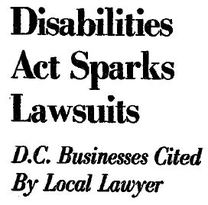"ADA is a culmination of 50 years of change... What the ADA did was leveled the playing field"
Patricia Wright, DREDF - July 22, 2000
Patricia Wright, DREDF - July 22, 2000
Reality of Equality
The nation reacted to the signing of the ADA with mixed feelings. While the disabled community celebrated the opening of once closed doors, opponents labeled the law intrusive and costly.
Advocates
|
“The beauty of the ADA was it was an effort where people in the grassroots were just as important, if not more important, than people in Washington.”
Liz Savage, Epilepsy Foundation America - February 26, 1997 "I really believe that people with disabilities are the greatest untapped resource in our country today."
ADA National Network 20th Anniversary of the ADA - Congressman James Langevin - June 17, 2010 |
“[The ADA] will proclaim to America and to the world that people with disabilities are fully human; that paternalistic, discriminatory, segregationist attitudes are no longer acceptable.” Justin Dart, Father of the ADA - Fall, 1990 |
|
|





